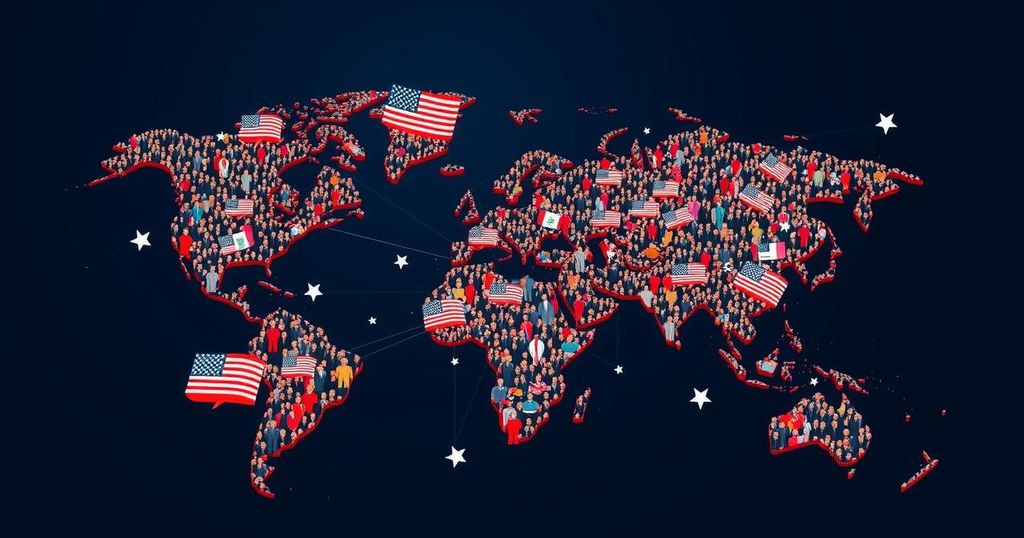The 2024 U.S. presidential election is receiving close scrutiny from global perspectives, as experts from various regions convened at MIT’s Starr Forum to discuss its implications on international politics. Panelists highlighted changing perceptions of American democracy, increasing global polarization, and the competition with China for influence in regions such as Africa. Overall, the forum revealed concerns about the erosion of democratic norms and the influence of political trends worldwide.
The 2024 United States presidential election is poised to generate significant global ramifications, prompting widespread interest from leaders and citizens around the world. “The 2024 US Presidential Election: The World is Watching,” a recent Starr Forum held at the Massachusetts Institute of Technology (MIT), explored international perceptions regarding the election’s potential impact on various nations and regions. Moderated by Professor Evan Lieberman, Director of MIT’s Center for International Studies (CIS), the forum brought together experts from Africa, Asia, Europe, and Latin America to share their perspectives. The forum highlighted the diverse viewpoints surrounding American democratic ideals and its influence in different geopolitical contexts. Dr. Katrina Burgess of Tufts University underscored a significant shift within the Latin American diaspora in the United States, stating, “American democracy is no longer perceived as a standard bearer.” This sentiment reflects the complex relationship between Latin American communities and American politics, particularly on issues concerning economic relations and immigration. Prerna Singh, a political scientist at Brown University, described how India, the world’s largest democracy, exhibits troubling trends away from democratic norms. She asserted, “Indian leaders don’t confer with the press. Indian leaders don’t debate like Americans,” indicating a diminishing commitment to democratic engagement. John Githongo, the Robert E. Wilhelm Fellow at CIS, addressed Africa’s perspective, outlining a declining regard for American influence and an increase in Chinese investment within the continent. He remarked, “America’s soft power infrastructure in Africa is crumbling,” drawing attention to the continent’s potential geopolitical realignment. Moreover, Daniel Ziblatt, a Harvard professor, noted the rise of populism and right-wing extremism in Europe, drawing parallels with the dynamics observed in the United States. He emphasized the significance of these developments in the context of transatlantic relations, especially in light of recent geopolitical tensions originating from Russia’s actions in Ukraine. While panelists agreed that there appears to be diminished global investment in the U.S. election results compared to previous cycles, they acknowledged the universality of political polarization. Dr. Burgess posited that this trend is experienced worldwide, whereas Dr. Ziblatt suggested a mutual influence of extreme political behaviors across various national contexts. Ultimately, the forum illuminated the intricate tapestry of global political dynamics in relation to the U.S. presidential election, revealing concerns about American democracy, shifting geopolitical allegiances, and the interplay of domestic and international political phenomena.
The 2024 United States presidential election is anticipated to have substantial implications for international relations and global political dynamics. Understanding how different countries perceive this election can provide valuable insights into future global alliances, economic partnerships, and efforts to uphold democratic norms. Events like the Starr Forum at MIT highlight the importance of contextualizing American political developments within a broader international framework, prompting discussions among experts across regions reflecting on their respective governmental structures and public sentiments towards American democracy.
The discussions held during the Starr Forum clearly demonstrated that the 2024 U.S. presidential election is not merely a national concern, but rather a focal point for global political scrutiny. Insights gathered from experts across diverse regions suggest that while American political norms may have once inspired other democracies, there is now a hesitance to uphold them amid rising populism and challenges to democracy. The emerging geopolitical landscape, particularly in relation to U.S.-China dynamics, continues to shape how nations view the implications of the U.S. electoral process.
Original Source: news.mit.edu






